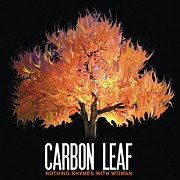Alan Sculley, North County Times, San Diego has this to say about the band:
Plenty of longtime Carbon Leaf fans will notice that on the group’s two most recent CDs, 2004’s “Indian Summer” and the newly released “Love, Loss, Hope, Repeat,” there’s an obvious absence of the sound that once got Carbon Leaf labeled by some as a Celtic/bluegrass band.
It’s not that Carbon Leaf wanted to abandon its Celtic roots or had f
 orgotten about that influence. It’s just that the last time the band got its “Irish” up, the results were less than enthralling.
orgotten about that influence. It’s just that the last time the band got its “Irish” up, the results were less than enthralling.“The albums are decidedly non-Celtic,” Carbon Leaf singer Barry Privett saidin a recent phone interview. “They weren’t intended to get us out of that
(Celtic) box so much that we had kind of grown tired of that box. For‘Indian Summer’ we had written probably 22 songs to see which ones would make the cut. A lot of the songs had that Celtic influence, but we had already kind of been mining that territory for a few years. The songs that we had written that had that influence just didn’t feel inspired anymore.”
As a result, “Indian Summer” and especially “Love, Loss, Hope, Repeat” have emphasized Carbon Leaf’s rock and pop influences.
The direction is apparent with tracks such as “Learn to Fly,” “A Girl and Her Horse” and “Under the Wire,” which all feature strong pop melodies. The rootsier side of Carbon Leaf, meanwhile, shows on acoustic-leaning tunes such as “The War Was in Color” and “Block of Wood,” while on “Comfort” and “Texas Stars,” the group rocks a bit more briskly.
The more pronounced rock and pop influences surfaced on “Love, Loss, Hope, Repeat” ---- the band’s seventh CD ---- for a variety of reasons, Privett said, including the fast pace that surrounded the writing and recording of the CD.
After spending January writing material for the CD, the band faced a tight schedule for recording. The band, which also includes Carter Gravatt (guitar/mandolin), Terry Clark (guitar), Jordan Medas (bass) and Scott Milstead (drums), had only three weeks for the session and a couple of weeks for overdubs.
This meant there wasn’t time to be too fussy with the basic tracks for “Love, Loss, Hope, Repeat” or to do much additional recording during the overdub sessions ---- a situation that led to a leaner, more rocking sound on the CD.
This more direct sound, though, wasn’t unplanned. The group went into “Love, Loss, Hope, Repeat” wanting to create songs that were shorter and more tightly constructed than on its first several albums.
They found an ally in that mission in Peter Collins, a producer whose resume includes projects with Bon Jovi, Elton John and Rush.
“He’s kind of pop oriented (in his) approach to song structure,” Privett said. “We tend to write long intros and a solo and a bridge and maybe a second bridge. We’ll add lots of pieces to songs. He kind of is the opposite. So we had to work with him (on arrangements). And we were in agreement. We wanted to try something a little different, shorter songs and little bit more focus on getting more into a smaller time frame.”
The shift toward more of a rock-pop sound should help Carbon Leaf further expand its audience.
For about a dozen years, the Richmond, Va.-based band has been used to earning fans the hard way ---- one show at a time. For the first nine years of its career, Carbon Leaf was a do-it-yourself band in the purest sense of the term. The group self-released its first five CDs and was self-managed, self-booked and self-promoted.
But things began to accelerate for the band in 2002 when it won the Coca-Cola New Music Award for the song “The Boxer,” off of the band’s fifth and final self-released CD, “Echo Echo.” Part of the prize was the opportunity to become one of the rare unsigned bands to ever play on the American Music Awards.
The exposure from the award and the AMA performance enabled the group to attract a manager, booking agent, publicist and lawyer, while extensive touring coupled with the increased media attention from the group’s AMA performance and some scattered radio play for “The Boxer” helped raise Carbon Leaf’s profile.
Eventually record labels started to check out the group, and after once again funding the recording of “Indian Summer” itself, Carbon Leaf signed to Vanguard Records, which released the CD in 2004. Privett said it was time to put the distribution and marketing capabilities of a record company behind the band.
The move so far seems to have worked. The song “Life Less Ordinary” off “Indian Summer” became a modest adult radio hit and gave Carbon Leaf its first taste of mainstream exposure.
“You probably end up making less money (than) the setup as an independent band, but you get more exposure,” Privett said. “So we were ready to take that risk, knowing there’s not a whole lot to
 lose. You can always go back to being independent if it doesn't work out."
lose. You can always go back to being independent if it doesn't work out."I found this band while listening to a Pandora station I created around another great band; Moxy Fruvous . I was immediately impressed by their fresh, clean sound and witty word-play.
Coming up on May 19, 2009 they are dropping a new album enltitled: Nothing Rhymes With Woman.






No comments:
Post a Comment